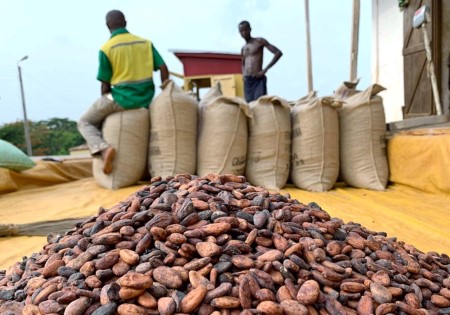Ghana’s government announced Wednesday a substantial 45% increase in the producer price of cocoa for the 2024/2025 crop season, a move aimed at curbing smuggling and improving the welfare of cocoa farmers.
Agriculture Minister Bryan Acheampong revealed that the new price, effective immediately, raises the payment for a 64-kilogramme bag of cocoa beans to $192, up from $132. This adjustment brings the farm gate price to $3,063 per tonne, marking a dramatic 129% increase from the opening price of $1,335 per tonne for the 2023/2024 season.
“This is an unprecedented increase of 129.36 percent,” Acheampong stated. “This appreciable increment in the producer price of cocoa signifies the government’s commitment to improve the sector and the livelihoods of the Ghanaian cocoa farmer.”

The price hike follows a mid-season adjustment last year when the government raised prices from $1,335 per tonne to $2,113 per tonne, responding to soaring international cocoa prices. Recently, New York cocoa futures have surged above $7,000 per tonne due to poor harvests in Ghana and Ivory Coast, the world’s top producers.
Experts suggest that increasing the farm gate price could reduce incentives for illegal cross-border sales, allowing farmers to reinvest in their cocoa farms and potentially ease the global supply shortfall. Ghana’s cocoa harvest has declined in recent years due to weather challenges, disease, inadequate inputs, and smuggling.
The cocoa sector, accounting for about 10% of Ghana’s GDP, relies heavily on smallholder farmers. However, the depreciation of the Ghanaian cedi, which has lost over 20% of its value against the dollar this year, has further squeezed farmers’ margins — even as international prices reached $10,000 per tonne in March before retreating.
Production costs have also soared, with fertilizers and other essential materials becoming increasingly expensive. Poor road networks have pushed up transport costs, adding to farmers’ challenges.
The sector has also been grappling with the Cocoa Swollen Shoot Virus Disease, which has devastated nearly 500,000 hectares of cocoa farms in recent years, representing about 29% of Ghana’s total cocoa production area.
This price increase is part of a broader strategy to address the multifaceted challenges facing Ghana’s cocoa industry. By offering more competitive prices, the government hopes to not only discourage smuggling but also to incentivize farmers to maintain and potentially expand their cocoa production.
The move comes at a critical time for the global cocoa market, with supply constraints driving up prices worldwide. Ghana’s decision could have ripple effects across the industry, potentially influencing pricing strategies in other cocoa-producing nations and affecting global chocolate prices.
As the 2024/2025 crop season begins, industry observers will be watching closely to see if this significant price hike achieves its dual goals of reducing smuggling and improving farmer livelihoods, while also contributing to a more stable global cocoa supply.



